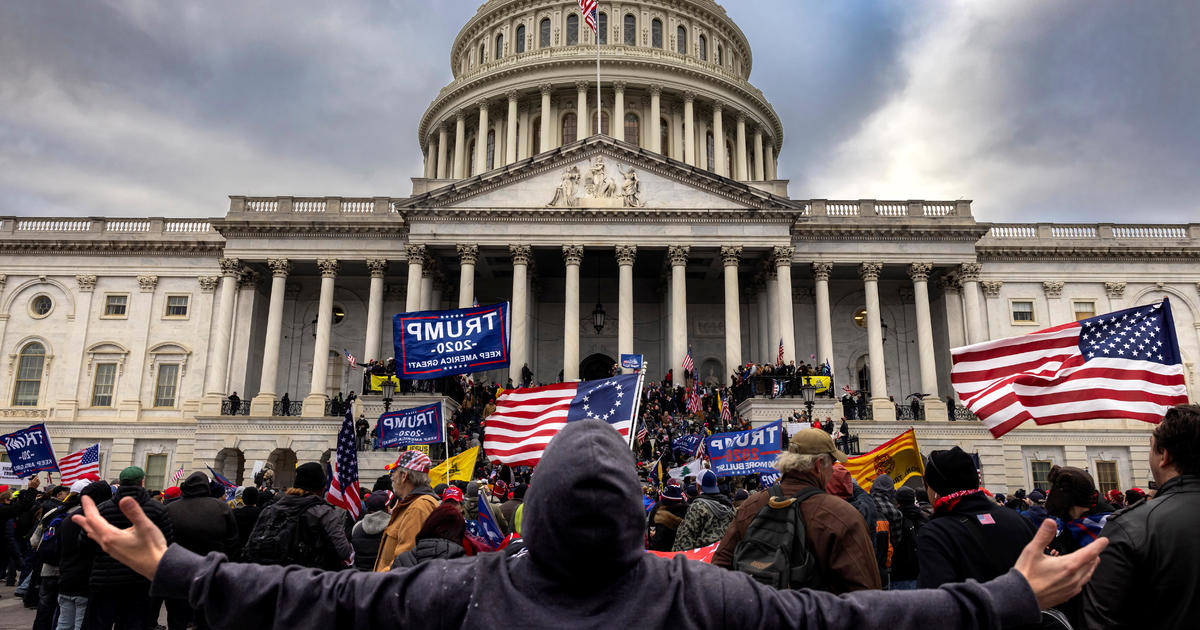CBS News
Supreme Court to hear dispute over obstruction law used to prosecute Jan. 6 defendants

Washington — The Supreme Court said Wednesday that it will hear a court fight involving the breadth of a federal obstruction law that has been used to prosecute scores of defendants for their alleged actions during the Jan. 6, 2021, assault on the U.S. Capitol, as well as former President Donald Trump.
An eventual decision from the Supreme Court in the case known as Fischer v. U.S. could have far-reaching impacts, since the Justice Department has charged more than 300 people under the obstruction statute in cases related to Jan. 6.
Most significantly, special counsel Jack Smith has charged Trump with a single count of corruptly obstructing and impeding an official proceeding, namely Congress’ certification of the Electoral College results on Jan. 6. The former president has pleaded not guilty to that offense and the three others he is facing in the case related to the 2020 presidential election. A trial in Trump’s case is set to begin in March.
The Supreme Court case
Requests for the Supreme Court to weigh in arose from three criminal prosecutions in the federal district court in Washington, D.C., of defendants facing charges stemming from their participation in the assault on the Capitol.
Each of the three men — Edward Lang, Garrett Miller and Joseph Fischer — were charged with corruptly obstructing, influencing or impeding an official proceeding. The provision is part of the Sarbanes-Oxley Act, which was passed in 2002 following the Enron scandal.
The U.S. district court granted Miller’s request to dismiss the obstruction count, finding that while the joint session of Congress on Jan. 6 was an official proceeding, the conduct alleged in the indictment was outside the scope of the law. The provision, it said, was limited by language earlier in the statute and only applied if a defendant took “some action with respect to a document, record, or other object in order to corruptly obstruct, impede or influence an official proceeding.”
Prosecutors did not allege that Miller “took some action with respect to a document, record, or other object in order to corruptly obstruct, impede, or influence Congress’s certification of the electoral vote,” the district court said.
The court applied its reasoning to dismiss the obstruction counts against Fischer and Lang, but the U.S. Court of Appeals for the District of Columbia Circuit reversed the dismissal orders. A divided three-judge panel found that the law “applies to all forms of corrupt obstruction of an official proceeding” and said the lower court erred when it interpreted the provision to apply only to actions taken regarding documents, records or other objects.
During the appellate proceedings, federal prosecutors dismissed one of the counts against Miller for transmitting a threat in interstate commerce, and he pleaded guilty to remaining charges. Miller was sentenced to 38 months in prison and three years of supervised release.
The three defendants appealed the D.C. Circuit’s decision to the Supreme Court, raising the question of whether their alleged conduct on Jan. 6 falls within the scope of the obstruction statute. Each, however, has different reasoning as to why their alleged acts are not covered by the law.
Others who entered the Capitol on Jan. 6 and were prosecuted under the measure urged the Supreme Court to step in. Trial courts, prosecutors and defense attorneys “have no clear guidance on the requirements or scope” of the obstruction law, lawyers for three other Capitol defendants told the justices in a filing.
They argued that none of the three judges on the D.C. Circuit, Judges Gregory Katsas, Justin Walker and Florence Pan, agreed on what conduct violates the statute, and warned that the broad reading of the law means it would cover any unlawful act that could be tied to an official proceeding.
The Biden administration urged the Supreme Court to turn away the cases, arguing in part that the obstruction provision is broad enough in its reach to cover the conduct of the Jan. 6 rioters and encompasses conduct directed at the official proceeding itself, rather than records or evidence that might be considered.
“It is therefore natural to say that a defendant obstructs an official proceeding by physically blocking it from occurring — as happened here when petitioners and others violently occupied the Capitol for several hours and thereby prevented the joint session of Congress from doing its work,” Solicitor General Elizabeth Prelogar, who represents the government before the high court, wrote in a filing.
The Biden administration also warned that it is too early for the Supreme Court to get involved in the cases, since neither Miller, Fischer nor Lang have been convicted of obstructing an official proceeding.
CBS News
Students and parents swap the bus for biking to school together

Watch CBS News
Be the first to know
Get browser notifications for breaking news, live events, and exclusive reporting.
CBS News
Possible breakthrough in shingles treatment

Watch CBS News
Be the first to know
Get browser notifications for breaking news, live events, and exclusive reporting.
CBS News
How border towns view the immigration debate

Watch CBS News
Be the first to know
Get browser notifications for breaking news, live events, and exclusive reporting.

